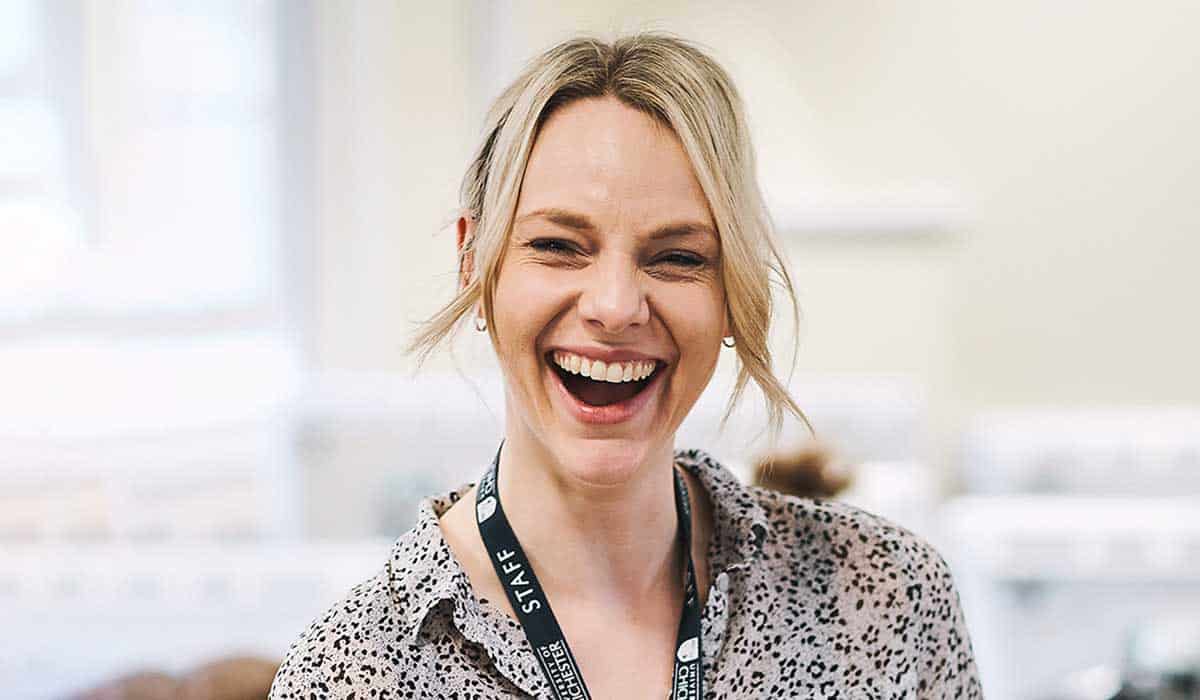A Conversation With: Dr Lucie Clements

“I will miss the community immensely, and the wonderful chats and moments of inspiration I have had with colleagues in other departments. Because of that community, I’ll be coming in to the University every now and then.”
_________
What is your research specialty and what inspired you to get into this field?
My research applies sport and performance psychology in dance. In many sports you can measure success (e.g. Did they score? Are they running faster?), whereas dance is subjective, and often in the eye of the spectator, so there are lots of psychological complexities. I am interested in understanding how to develop creatively and technically excellent dancers, while ensuring that excellence doesn’t come at the cost of wellbeing. I had been through some tough experiences with dance injury. The teaching was not at all supportive, and at times it was sarcastic and very critical. A dancer’s body, mental health and self-worth are intertwined with the environment that the teacher or director creates, so I developed a fascination with psychology and dance teaching. I couldn’t be a teacher because of injury, so I went with a BSc Psychology, and I wrote and published my dissertation on dance. In my first job as a Neuroscience Research Assistant we were measuring brain activity when watching dance, and my boss asked me to email Edel Quin (who is now University of Chichester’s BSc Dance Science Programme Coordinator). It was that email that led me to apply for my masters, where she and Dr Gemma Harman were my lecturers. Once I was immersed in dance research doing my PhD, there was no doubt in my mind.
.png)
Why did you start the @thedancepsychologist Instagram/blog and what are the main focuses?
Dance is about the body; training to look a particular way, to be “a technically good dancer”, to avoid injury and to perform well. Psychology manifests in each of those aspects, but its not a compulsory part of teacher training to learn about psychology, and some dance teachers have no formal teacher training. Research indicates high prevalence of performance anxiety, perfectionism and other wellbeing concerns, but these aren’t being routinely addressed in practice, added to which there are few resources available for dancers that translate psychology research into practical advice. It was always at the back of my mind that once I had the skills and experience I would do two things. Firstly, create resources with psychology information for dancers, and secondly improve awareness through education – which I think I am now achieving.
When I started delivering talks to dance schools and companies, I only did four or five talks a year and then in 2018 I built a website and started using Instagram to promote my work and share bits of psychology information. There are many misconceptions about psychology, so my aim is to share science and research in a way that make people comfortable and normalises talking about the mind, while also providing a resource that is evidence based. The response has been wonderful, and Instagram has connected me to amazing opportunities to work around the world – just in the last few weeks I have given online talks in the USA, Canada, Hong Kong (and Bournemouth!). But it also makes me realise how far there is to go. Many dancers have to trawl social media to get a tiny snippet of basic understanding about mental health. That’s not enough – I want dancers to learn about Psychology in depth in their training and career, and to work in an environment that is psychologically safe and promotes good wellbeing. My social media and blog are effective for raising awareness, but I hope it will be a gateway to bigger conversations and changes in practice.
.png)
What services are you able to offer with ‘the Dance Psychologist’ and what do you hope to achieve?
It’s a huge hope, but to improve the culture of dance through psychological education. That means teaching dancers about performance anxiety, talking to teachers about how to create a healthy motivational climate, talking to medical professionals about the pressures a dancer may perceive to return to performance while injured. I want to create sustainable change, which can’t be done in a one-off session, it has to be a long-term commitment. When I started, I tended to go to a school or company once. Now, times are changing, maybe partly due to the Pandemic, and I am invited to give regular talks, design and deliver extensive curriculums, help to implement changes from leadership down, or advise on research to measure how embedding changes relate to wellbeing.
Some of my work will be in collaboration with Ben Darmanin, an Artistic Director and Associate Producer to the award – winning choreographer and director Andy Blankenbuehler (Cats, Dirty Dancing, Hamilton). Ben and I are wholly aligned in our aims. He has spent years reading and learning about psychology out of his own interest, but he understands the need to embed changes in a systematic, evidence-based way. Over the last year we have begun developing a strategy that blends together my scientific approach and his industry expertise to teach Psychology in a way that I’ve never seen before. We are developing this for all performers, not just dancers.
There are a few personal aspirations too. I hope to mentor others, for example, over the last year a graduate of the BSc Dance Science at Chichester, Tabitha Moorse, has been supporting me with admin and social media for my business, and assists in workshops that I am delivering. I want to create more opportunities for graduates and then build a whole team of experts in this area. My other aims are about improving perceptions of dance as a valuable career and advocating for women in science. I have some projects coming up that relate to both of those where I have been asked to speak about my career crossing the arts-sciences disciplines, which is very exciting!

What are you going to miss most about working at the University of Chichester?
I will miss working with the Psychology and Counselling team, especially Dr Antonina Pereira. My PhD and research are in a less-than-mainstream area of Psychology, but Antonina championed me and dance psychology at every opportunity, while also supporting my career development as an academic and leader. I will miss the community immensely, and the wonderful chats and moments of inspiration I have had with colleagues in other departments. Because of that community, I’ll be coming in to the University every now and then. Andrew Wright has asked me to implement Performance Psychology workshops into the BA Musical Theatre Performance as a permanent feature. I will also continue to supervise two fantastic Postgraduate students doing work in Dance Psychology and continue dance and mental health research with my colleague Dr Moitree Banerjee. So, it’s not really a goodbye!
Find out more about Dr Lucie Clements work within Dance Psychology
Written by Dr Lucie Clements, The Dance Psychologist





